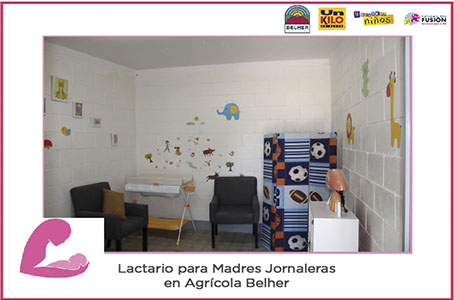Lactation room for mothers in the grower company “Agrícola Belher”

Agrícola Belher in conjunction with the foundations: Un Kilo de Ayuda, Nuestros niños and Fundación Fusion por los Niños de México, A.C., make available to the mothers that work in the company, a lactation room that has been operating since February at Campo Lo De Beltrán.
This lactation room is equipped with: Electric extraction equipment, sterile pouches to store breast milk, bottle sterilizer, refrigerator, changing table, bathtub, comfortable chairs, tables, soap dispenser, paper towels; Everything necessary so that mothers who are breastfeeding can have a successful breastfeeding and work at the same time without sacrificing either.
Breast milk is the first natural food for children, providing all the energy and nutrients they need during their first months of life. The World Health Organization (WHO) recommends exclusive breastfeeding during the first six months of life and in a complementary way up to two years.
For the baby
-
Breastfeeding helps children reach their potential for growth, health and development.
-
Breast milk contains the exact nutrients your baby requires for healthy growth and development.
-
It prevents diseases like diarrhea, obesity, meningitis, allergies, leukemia, malnutrition, sudden death and infections, even when the babies go to daycare.
-
Breastfed children have half the disease episodes compared to those who are not breastfed.
-
It helps their psychomotor development and IQ.
For the working mother
-
Breastfeeding creates an immediate bond with your baby.
-
It decreases the risk of postpartum hemorrhage.
-
Reduce the risk of breast and ovarian cancer.
-
Lower risk of postpartum depression.
-
Decreases diabetes and hypertension.
-
Reduces obesity.
-
Lower risk of osteoporosis.
-
Less family expenses, since breast milk is a natural resource
For the company or institution
-
Institutions with a breastfeeding support program promote healthier mothers and children, resulting in:
-
A reduction in absenteeism from working parents.
-
Minor medical expenses for the institution.
-
Greater satisfaction and fidelity of working women with your company.
-
Greater retention of trained employees.
-
Decreased turnover or loss of skilled women due to the birth of a baby.
-
Or Greater productivity.
-
Institutions that are socially responsible and respectful of human rights.
-
Improvement of the corporate image.
-
Greater competitiveness.
-
Avant-garde institutions in policies and facilities that promote the rights of their employees.
-
A favorable working environment for working women.
-
Fostering a healthier workforce.
-
Compliance with the normative provisions regarding breastfeeding.
-
Businesses that adopt breastfeeding support programs have had savings of $ 3 per $ 1 invested. Indirect costs of absenteeism, which include replacement of staff, overtime, lost service, or downtime, may represent a direct cost of up to 200%.
-
A woman without institutional support for breastfeeding can have feelings of fear and anguish, delay return to work, decrease hours worked, have lower productivity and easily give up; While a woman with institutional support rejoins faster to work, has greater productivity, greater loyalty, has a sense of belonging and motivation.
-
Companies that have breastfeeding support programs retain 95% of working mothers after they return from their maternity leave (compared to 59% of companies that do not have a maternity program).
For society
-
Promoting breastfeeding is a public health policy that improves overall health and reduces health spending by reducing the risk of numerous diseases.
-
Breastfeeding helps to protect nature, as it reduces environmental pollution, does not generate waste or consume resources, does not need to use fuel, or deplete the environment.
Source: Pan American Health Organization, World Health Organization.


